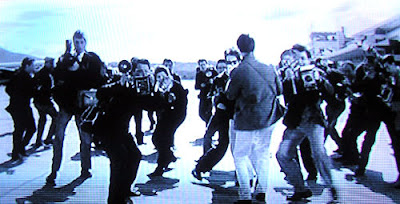
You may or may not have seen a small spat of sorts take place over the past weekend between former ESA boss Doug Lowenstein and, I guess, we the gaming press. It's likely that you at least already know that Jack Thompson has been disbarred permanently -- i.e, he can no longer practice law, basically for Doing it Wrong and acting like a nut.
Lowenstein wrote a letter to Kotaku in which he basically asserted that Thompson, as a situation, would never have escalated to the extent that it did if not for the media being willing to cover his every step. "The media knew well that he was a charlatan who wholly lacked credibility. But hey, they said, he was news and could not be ignored. That was a cop out. It gave Thompson a platform he might not have had for as long as he did," said Lowenstein's letter.
GamePolitics' Dennis McCauley, who covered Thompson's legal issues more exhaustively than any other outlet and even published his court transcripts online, turns the tables of blame on Lowenstein, likening Thompson to a schoolyard bully who pushed all the harder because the ESA (when headed by Lowenstein) as representatives of the game industry, never pushed back.
I don't exactly consider Destructoid's Jim Sterling a member of the "games press" per se -- he himself admits he's an entertainer, not a journalist, and also admits that covering Jack's antics was "good for business" as far as amusing his audience.
So basically, McCauley maintains that it fell to the media to call out Thompson's fallacious and often sensational attacks against the game industry each and every time because game publishers and the ESA rarely stood up for themselves. Lowenstein says that responding to Thompson's clearly unbalanced attacks legitimized them and "fed" the machine, and was both immature and a "cop-out" used to drive traffic. Destructoid's Sterling notes rather aptly that just ignoring a problematic person isn't necessarily the definition of maturity, and notes that his approach to game writing values entertainment over maturity or usefulness anyway.
To me, there actually seems to be a little bit of validity on all sides. Today at Gamasutra, my publisher Simon Carless tackles the issue in a response piece that basically says most of the things I would have liked to.
I would add, though, that Lowenstein's argument is complicated a little bit by the fact that, I think, the games biz is still struggling to define who its "media" is and what they do. Lumping together "the media" as some sort of nebulous, sharklike entity happens everywhere, not just in games -- when in fact we have neutral news reporters, those who focus on putting an entertaining slant on events, those who focus on interpreting all issues through a specific viewpoint, those that cover broader headlines and those that focus on specific industries, and each has its own level of usefulness to different audiences.
The lines are even harder to define in the games biz due to the prevalence of community-led websites, blogs, message boards and things like that, which I'd argue are more responsible for spreading headlines of one sort or another than the journalists are. How often does a straight news story get elected by user vote into the top of Digg, for example? And how often do you read an original news story online that wasn't linked from somewhere else from somewhere else from somewhere else? Thanks to aggregators that tend to promote the most-trafficked news stories, it was ultimately the readers, and not the writers, that made Jack Thompson front-page news.
So is Lowenstein blaming the tabloid-style blogs for sensationalizing Thompson? If he is, that's unfair, because it's their job to post about the things that their users enjoy discussing. Is he blaming news reporters for putting up headlines about Jack's legal action and the consequences to his career? If he is, that's unfair too, as Simon points out -- Thompson's sued major publishers and named them as defendants in murder cases. Who exactly did what wrong, Doug? Don't group us all together.
I'm not saying Lowenstein is wholly off base, by the way. But he's accused us of copping out -- and blaming "the media" is a real big cop-out, too.
By the way, speaking of sensationalism and front-page news, I put together a piece for Gamasutra today in which I talked to Electronic Arts, the ESA and IDC analyst Billy Pidgeon about PC game piracy and Spore's little DRM problem. Even if you're not playing Spore, you've heard about that one, too, right? And let me guess -- it's because the internet noise made it a big deal to you.



